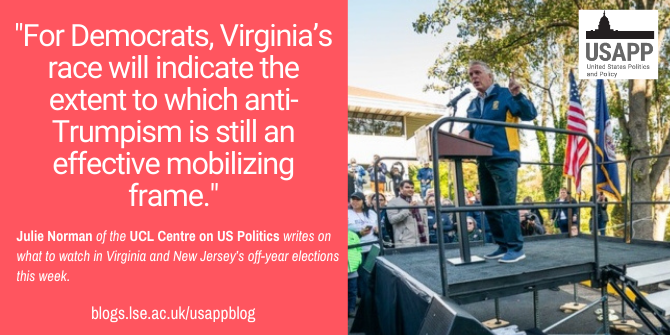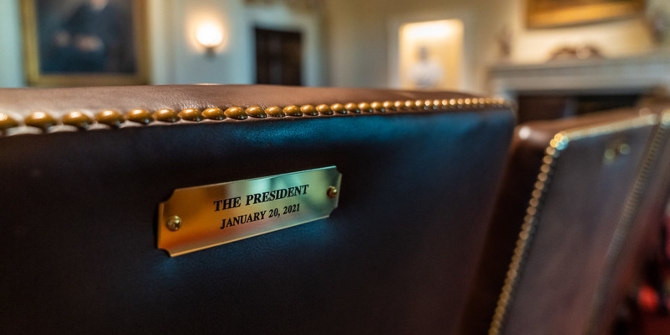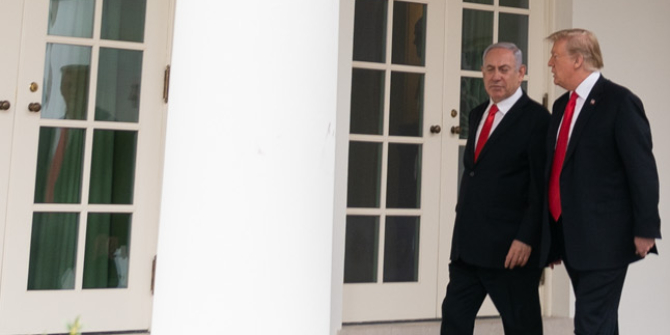 The 2022 midterms are over a year away, but Election Day 2021 still matters, writes Julie Norman. With gubernatorial races in Virginia and New Jersey and mayoral races in 40 major cities, both parties will be using this Tuesday’s elections to shape their narratives and inform their trajectories in the months ahead.
The 2022 midterms are over a year away, but Election Day 2021 still matters, writes Julie Norman. With gubernatorial races in Virginia and New Jersey and mayoral races in 40 major cities, both parties will be using this Tuesday’s elections to shape their narratives and inform their trajectories in the months ahead.
What are the key races to watch tomorrow?
Most eyes on Tuesday night will be on Virginia’s gubernatorial election. Along with New Jersey, Virginia is the only state that holds elections for state offices in the year following a presidential race, meaning that the result is often interpreted as a barometer assessing the administration’s first year and providing a preview for potential voting patterns in the midterms.
While both states’ elections are ones to watch, Virginia is the nail-biter. Although Biden won Virginia by ten points, the race is essentially a dead heat going into Election Day, with Democrat Terry McAuliffe and Republican Glenn Youngkin polling at 49 and 48 percent respectively. Further, Virginia is a state that reflects many of the demographic divides currently defining US politics, particularly between urban and rural voters and those with a college degree and those without one. The state also includes large suburban voting blocs that are crucial for both parties.
How is this year different?
The Virginia gubernatorial election often serves as a check on the White House, with voters historically favoring the opposing party’s candidate for governor. (McAuliffe’s narrow victory in 2013 following Obama’s re-election was a rare exception that he is hoping to repeat.) With Biden’s approval ratings at a low point in his presidency so far, Tuesday’s elections will mark the first opportunity for voters to weigh in on his performance.
Just as importantly, Tuesday marks the first election since 2016 without Trump in the White House or on the ballot, and Youngkin has been careful to neither embrace nor fully distance himself from the former president. A victory (or even a close race) for Youngkin will be instructive for the GOP on how to win back voters and rebuild the party at the state and local levels, especially in the suburbs, even as Trump’s national influence looms large.

“GOTV Rally with Governor Terry McAuliffe“ (CC BY-NC-SA 2.0) by Biden For President
What issues are defining the debate?
With COVID-19 lingering, inflation rising, and the infrastructure and spending bill still stalled in Washington DC, McAuliffe has struggled to find a recent victory at the national level to highlight in Virginia. Instead, Democrats have focused on portraying Youngkin as “Trump in khakis,” banking on anti-Trumpism as a galvanizing force for Democratic votes and turn-out. But it’s unclear if that framing will stick, particularly for independents and moderate suburbanites who voted against Trump but view Youngkin as a more traditional Republican, especially as he has avoided making direct links to Trump since the primaries.
Youngkin meanwhile has largely framed his campaign as one for parental rights in public schools, pushing back on perceived progressive influence in public schools. Specifically, he has doubled-down on “culture war” issues that have dominated school board meetings in Virginia and across the country, such as the teaching of race and rights for transgender students in the classroom.
What will the results mean for both parties?
A victory or even a close race for Youngkin will inform GOP strategies for next year’s midterms, perhaps providing a blueprint on how to leverage “culture war” issues and frame them around public schooling to make gains in the suburbs. Further, his light-touch approach to engaging with Trump may be instructive for those seeking to bridge both the GOP base and moderates (although future candidates may have less space to maneuver around Trump if he announces another run prior to the midterms).
For Democrats, Virginia’s race will indicate the extent to which anti-Trumpism is still an effective mobilizing frame. A loss or even a tight race will underscore the need for real policy wins in Washington, as well as a better strategy for responding to their opponents playing up of “culture war” divisions nationally and locally. Along with Virginia, the outcomes of mayoral races in cities like Atlanta and Boston will also stoke ongoing debates between moderates and liberals on how to balance progressive priorities with other issues such as public safety.
Will the elections matter for next year’s midterms?
Democrats will struggle to hold on to both houses of Congress in 2022 regardless of Tuesday’s outcomes. The incumbent’s party usually falls short in the midterms as voters register their discontents, and Democrats’ razor-thin majority – zero in the Senate and only eight in the House – is particularly tenuous. But Tuesday’s elections will be influential in shaping the narratives of both parties as they enter 2022, with implications for how they seek to mobilize voters, engage (or not) with Trump, and deal with divisions within their own party.
Please read our comments policy before commenting.
Note: This article gives the views of the author, and not the position of USAPP– American Politics and Policy, nor of the London School of Economics.
Shortened URL for this post: https://bit.ly/3pW1KOo
About the author
 Julie Norman – UCL Centre on US Politics
Julie Norman – UCL Centre on US Politics
Julie Norman (@DrJulieNorman2) is a Lecturer in Politics and International Relations at UCL and Deputy Director of the UCL Centre on US Politics (@CUSP_ucl).






